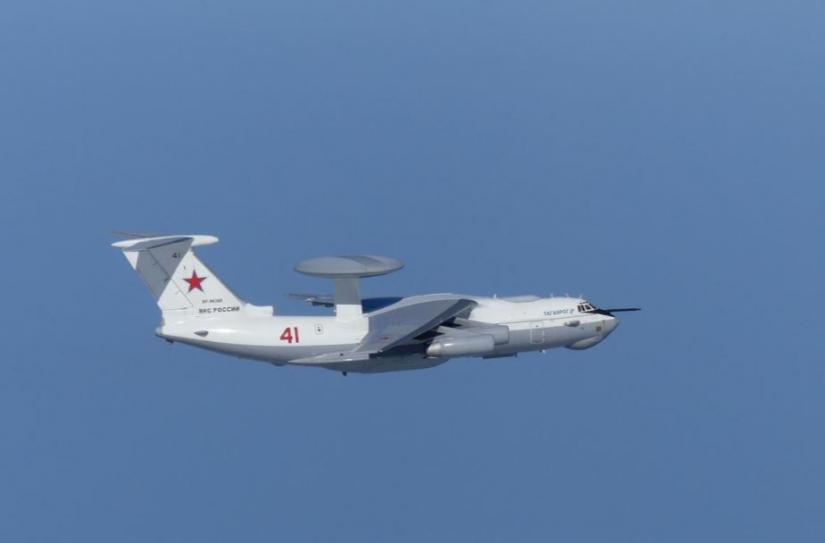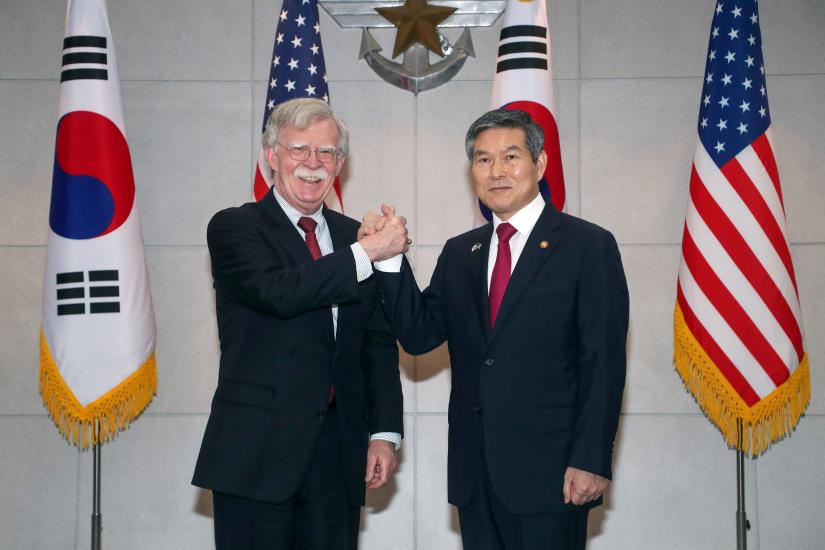 As bloodless encounters go, Tuesday's face-off between a Russian surveillance plane and South Korean fighter jets was as vicious as they come.
As bloodless encounters go, Tuesday's face-off between a Russian surveillance plane and South Korean fighter jets was as vicious as they come.
South Korean officials said their F-15 fighters fired several hundred warning shots and flares as they intercepted a Russian A-50 surveillance plane they say entered territorial airspace claimed by Seoul. The Russian aircraft, which was on patrol with Chinese jets, then withdrew, and Moscow and Seoul have been arguing diplomatically since then over where fault might really lie.
The incident appears complex – Russia claims its aircraft remained in international airspace throughout the encounter, which occurred over the Sea of Japan. But what is clear is that Tuesday's incident showed America's two greatest strategic rivals working together to simultaneously target and divide US allies. It's a situation that the Trump administration does not merely seem to lack a strategy for - it is frequently making matters worse.
 The location of Tuesday's incident hardly appears a coincidence. It took place over the disputed Dokdo or Takeshima Islands, jointly claimed by South Korea and Japan, producing a parallel diplomatic row between Tokyo and Seoul. But encounters of this nature – hostile states needling US allies while often avoiding confrontation with US forces – are becoming more widespread.
The location of Tuesday's incident hardly appears a coincidence. It took place over the disputed Dokdo or Takeshima Islands, jointly claimed by South Korea and Japan, producing a parallel diplomatic row between Tokyo and Seoul. But encounters of this nature – hostile states needling US allies while often avoiding confrontation with US forces – are becoming more widespread.
To an extent, the current face-off between Britain and Iran over the seizure of each other's oil tankers is a case in point. Those in charge in Tehran would probably have drawn the line at seizing a US commercial vessel, particularly given the scale of Washington's military forces in the region. Grabbing a British tanker, however, gave them many of the same propaganda advantages and leverage but for much less risk – as well as allowing Tehran to cast the incident as retaliation for Britain's seizure of an Iranian tanker off Gibraltar allegedly breaking sanctions on Syria.
Nerve Agent
The attempted assassination of a Russian defector in Salisbury with a nerve agent last year is also seen by some as a similar example of Moscow being willing to do things it would never have dared against the United States. But there are other examples, particularly Beijing's confrontations with its neighbours in the South China Sea and those of Russia in Eastern Europe.
For many in Washington, the most worrying thing about Tuesday's aerial incident will be the joint action between Moscow and Beijing. As the US military has refocused his attention on potential great power conflict rather than Iraq style counterinsurgency, there has been a general assumption the United States could only fight one such war at once. In other words, it could face down Beijing in the South China Sea or Russia in the Baltic States, but doing both at once would drastically stretch already faltering resources.
Russia and China working together militarily are not new. Russian ships joined Chinese counterparts to patrol the South China Sea last year. But it does seem to be on the increase.
For America's allies, the worry is perhaps even starker – they are increasingly concerned that a Trump or post-Trump administration might not wish to come to their aid at all. That's a situation compounded by many of the president's utterances.
 Killing Millions
Killing Millions
Viewed in isolation, Trump's comments this week that he could have won the war in Afghanistan quickly by killing millions of Afghans has only limited resonance, shocking though it is. But it will fit a much wider narrative about the presidency and America: that it disregards the rest of the world and holds even some of its closest partners in contempt.
Since his 2016 campaign, Trump has largely stepped back from his rhetoric of leaving allies like Japan to fend themselves – but his remarks are still widely remembered. As the 2020 election heats up, few would be surprised if he falls back on them once again.
Those tensions have manifested themselves in various ways, including at NATO and G7 summits. Some nations – particularly South Korea, Japan, Poland and perhaps now Britain under Boris Johnson – have moved hard to embrace and win over the mercurial US president. In Europe in particular, however, worries over US commitment have increasingly led to European states feeling they need much greater ability to coordinate and act alone.
Ways of doing that have included the northern European Joint Expeditionary Force, bringing together elements from Norway, Sweden, Finland, Britain, Belgium, Holland, Denmark and the Baltic states of Lithuania, Latvia and Estonia. The European Union is stepping up its own coordination measures, although attempts by French President Emmanuel Macron to push that process hard have met resistance.
The crisis in the Gulf might ramp it up further, with talk of a European protection mission for shipping likely modelled along the lines of the EU task force against Somali piracy earlier this decade.
Unfortunately, even disregarding the United States, America's European and Asian partners appear often increasingly divided. Just as the joint Chinese-Russian patrol on Tuesday exasperated Japanese-South Korean rivalries, both the Kremlin and Beijing have other ways to promote discord.
Suspected Russian leaks and election meddling, and pledges of Chinese investment are amongst the most apparent. In Austria, the recent far-right government was seen as uncomfortably close to Russia by many other nations, leading to a reduction in intelligence sharing. Moscow's sale of S-400 missiles to Turkey has further fractured that alliance, with Russia now offering to sell Turkey Russian warplanes to replace the F-35 programme from which Turkey was evicted in response.
Fundamentally, of course, most of the internal problems now faced by America and its allies come from their own domestic woes, not outside interference. Authoritarian states like Russia and China have at least equal domestic problems, as evidenced by the situation in Hong Kong. The worse they get, though, the more likely it is that these states may lash out and posture further.
A former reporter for Reuters, Peter Apps is a writer on international affairs, globalisation, conflict and other issues. He is the founder of the Project for Study of the 21st Century (PS21), a non-national, non-partisan, non-ideological think tank. Paralysed by a war-zone car smash in 2006, he also blogs about his disability and other topics.


